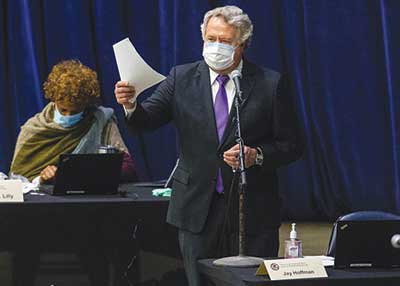Short session for Illinois Legislature nets Labor wins in response to pandemic
By CARL GREEN
Illinois Correspondent

Springfield, IL — It was only a four-day session, haunted by the specter of the COVID-19 pandemic, but the Illinois AFL-CIO was pleased with the results of the Illinois Legislature’s abbreviated spring session in late May.
“It was an exciting week for the Labor Movement as workers and their families scored big legislative wins,” said Illinois AFL-CIO President Tim Drea.
“The Illinois AFL-CIO was able to pass critical legislation that will provide workers with greater access to the resources they need to sustain themselves and their families during these challenging times.”
Drea cited these particular items that the AFL-CIO had supported in the session that ended May 24:
- Unemployment insurance extension.
- Workers compensation expansion.
- Vote by mail.
- Fair Tax constitutional amendment.
- Public employee protections bill.
- A $42.8 billion budget, balanced but anticipating pending federal assistance.
A DIRECT RESPONSE TO COVID-19
House Speaker Michael Madigan said the measures were a direct response to the effects of COVID-19 on Illinois’ working families.
“The people of Illinois are grappling with significant changes to their daily lives and historic levels of unemployment, especially those least able to afford it. Nurses, doctors, first responders and frontline workers across Illinois continue to battle COVID-19 and face risks to keep us safe,” Madigan said in closing the session. “This special session, House Democrats stood with all of them, passing legislation ensuring essential services continue uninterrupted and providing resources for the many people whose lives have been affected by this pandemic.”
UNEMPLOYMENT INSURANCE
The wide-ranging House Bill 2455, sponsored by Rep. Jay Hoffman (D-Swansea), the assistant majority leader, extends payment of benefits for seven more weeks on or after March 15, using $2 billion in federal funding. Federal benefit amounts will not count toward state benefit limits. Some waiting periods will be dropped, and some retroactive applications will be allowed. The bill was passed with strong support from both parties.
WORKERS COMPENSATION
House Bill 2455 also expands compensation to fire fighters, police officers and other “essential workers” who are infected by COVID-19 while on the job, including the “rebuttable presumption” clause that assumes the virus was contracted on the job instead of away from it (passed over the objections of employers’ groups). The changes were also made retroactive to the beginning of the pandemic, setting a time span of March 9 through Dec. 31 for the virus to have been contracted.
VOTE BY MAIL
In response to the pandemic, the Legislature voted to expand mail voting options for 2020. The State Board of Elections will provide mail applications and open an online portal to apply for ballots by mail. Applications will be sent to voters who voted early or by mail in the 2018 and 2019 elections and the 2020 primary. Curbside voting will be allowed, and Election Day will be a state holiday called “2020 General Election Day.” The bill passed almost entirely on party lines with Democrats favoring it and Republicans opposed.
FAIR TAX VOTE
The Senate voted to place Gov. J.B. Pritzker’s state constitutional amendment on the November ballot, giving voters the chance to switch from the current unfair flat rate system to a progressive rate system in which both the poor and wealthy pay a “fair share” of their income. The only people who would pay more are the wealthiest state residents. Those who aren’t wealthy would mostly see a small tax cut, and the state could begin to pay off some long-term debts. “The Fair Tax constitutional amendment will give middle-class workers much-needed tax relief,” the AFL-CIO said.
PUBLIC EMPLOYEES
A bill passed by large majorities included new protections for public employees. One section gives public employees 60 more days to recover from workplace injuries when the injuries were affected by COVID-19. Another requires “racinos” that combine racing and casinos to allow union organizing for groups of 10 or more employees as a condition of obtaining a gaming license. Hoffman sponsored the measure. “The intention is to give them rights — the right to organize and to get the information so that they could possibly organize and let them make that determination,” he said. Drea said many of those employees have low wages and poor working conditions.
VIOLENCE AGAINST WORKERS
Hoffman’s bill upgrades charges of battery to aggravated battery when committed against retail and service workers performing their duties. The bill was passed by wide majorities beyond party lines.
BALANCED BUDGET
Illinois will have a $42.8 billion budget going forward, about the same as before, whatever happens with the virus and the federal government response to it. The numbers rely on the federal government to complete a plan to provide aide to the states in dealing with the pandemic. For Illinois, the alternative would be borrowing up to $5 billion from the Federal reserve.
“The budget the General Assembly has sent to my desk acknowledges that massive economic disruption leads to difficult decision,” Pritzker said. “I think all 50 states are going to have to be revisiting their budgets if the federal government doesn’t come through.”
Sen. Rachelle Crowe (D-Glen Carbon), noted that the budget at least maintains the state’s commitment to fully funded schools. “While I have faith in teachers and students adjusting to e-learning, investing $12.6 billion in public education is fundamental to our students’ success and access for future opportunities,” she said. “To ensure students are not falling behind, we must establish economic relief to our school districts.”


Leave a Reply